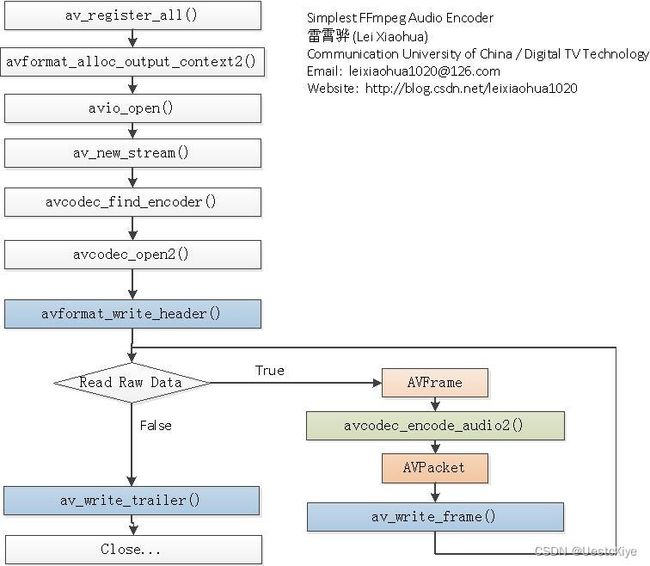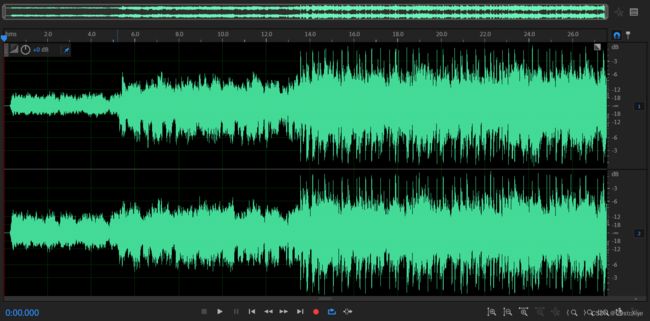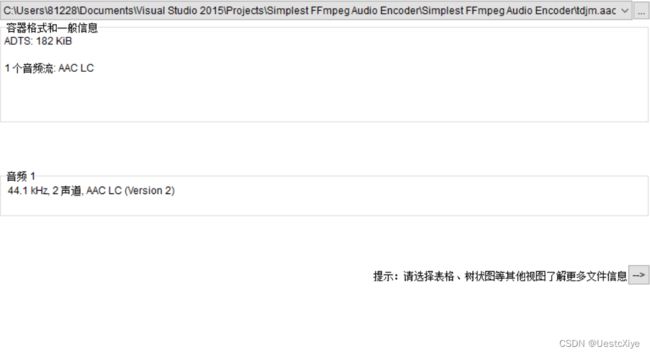最简单的基于 FFmpeg 的音频编码器(PCM 编码为 AAC)
最简单的基于 FFmpeg 的音频编码器(PCM 编码为 AAC)
- 最简单的基于 FFmpeg 的音频编码器(PCM 编码为 AAC)
-
- 正文
- 结果
- 工程文件下载
- 其他参考链接
最简单的基于 FFmpeg 的音频编码器(PCM 编码为 AAC)
参考雷霄骅博士的文章,链接:最简单的基于FFMPEG的音频编码器(PCM编码为AAC)
正文
本文介绍一个最简单的基于 FFmpeg 的音频编码器。
该编码器实现了 PCM 音频采样数据编码为 AAC 的压缩编码数据。
下面附一张使用 FFmpeg 编码音频的流程图。使用该流程,不仅可以编码 AAC 的音频,而且可以编码 MP3,MP2 等等各种 FFmpeg 支持的音频。图中蓝色背景的函数是实际输出数据的函数。浅绿色的函数是音频编码的函数。
简单介绍一下流程中各个函数的意义:
- av_register_all():注册 FFmpeg 所有编解码器。
- avformat_alloc_output_context2():初始化输出码流的 AVFormatContext。
- avio_open():打开输出文件。
- av_new_stream():创建输出码流的 AVStream。
- avcodec_find_encoder():查找编码器。
- avcodec_open2():打开编码器。
- avformat_write_header():写文件头(对于某些没有文件头的封装格式,不需要此函数。比如说 MPEG2TS)。
- avcodec_encode_audio2():编码音频。即将 AVFrame(存储 PCM 采样数据)编码为 AVPacket(存储 AAC,MP3 等格式的码流数据)。
- av_write_frame():将编码后的视频码流写入文件。
- av_write_trailer():写文件尾(对于某些没有文件头的封装格式,不需要此函数。比如说 MPEG2TS)。
另外,程序中的函数 flush_encoder():输入的像素数据读取完成后调用此函数。用于输出编码器中剩余的 AVPacket。
编码器代码十分简单,但是每一行代码都很重要。通过看本编码器的源代码,可以了解 FFmpeg 音频编码的流程。
本程序使用编译时间为 2014.5.6 的 FFmpeg 类库,下载链接:【免费】FFmpeg 库.zip。
开发平台为 VC2015。所有的配置都已经做好,只需要运行就可以了。
源代码:
// Simplest FFmpeg Audio Encoder.cpp : 定义控制台应用程序的入口点。
//
/**
* 最简单的基于 FFmpeg 的音频编码器
* Simplest FFmpeg Audio Encoder
*
* 源程序:
* 雷霄骅 Lei Xiaohua
* [email protected]
* 中国传媒大学/数字电视技术
* Communication University of China / Digital TV Technology
* http://blog.csdn.net/leixiaohua1020
*
* 修改:
* 刘文晨 Liu Wenchen
* [email protected]
* 电子科技大学/电子信息
* University of Electronic Science and Technology of China / Electronic and Information Science
* https://blog.csdn.net/ProgramNovice
*
* 本程序实现了音频 PCM 采样数据编码为压缩码流(MP3,WMA,AAC 等)。
* 是最简单的 FFmpeg 音频编码方面的教程。
* 通过学习本例子可以了解 FFmpeg 的编码流程。
*
* This software encode PCM data to AAC bitstream.
* It's the simplest audio encoding software based on FFmpeg.
* Suitable for beginner of FFmpeg
*
*/
#include "stdafx.h"
#include 结果
输入 pcm 文件:
采样率 64000,双声道,位深 16bit。
在 Adobe Audition 2020 中查看波形:
运行程序,得到采样率为 44100HZ 的输出文件 tdjm.aac。
用 MediaInfo 查看:
播放该 aac 文件,能听出来是周杰伦的《她的睫毛》。
注:pcm 也能播放,因为采样率是 64000HZ,比正常速度的 44100HZ 快,所以听着有些奇怪。
工程文件下载
GitHub:UestcXiye / Simplest-FFmpeg-Audio-Encoder
CSDN:Simplest FFmpeg Audio Encoder.zip
其他参考链接
- 新版ffmpeg编码AAC注意事项
- FFmpeg 音频编码



